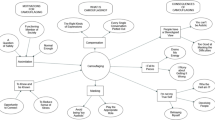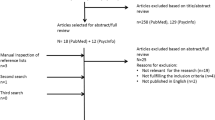Abstract
Parent-referred 2- and 3-year-olds and controls, participating in a longitudinal study of hyperactivity and related behavior problems, were observed with their mothers during play at an initial assessment and a 1-year follow-up. Mothers of problem children provided more redirection initially and made more negative control statements at follow-up than mothers of controls; problem youngsters tended to play more aggressively. Sex differences were prominent. Mothers of boys, regardless of referral status, were more directive at the initial assessment;their sons were less cooperative and somewhat more aggressive in their play. Maternal involvement in play decreased over time, possibly as a response to developmental changes in children's play. Group by time interactions indicated that mothers of control children provided fewer negative control statements at follow-up relative to mothers of problem children and to their own levels at the first assessment; mothers of problem youngsters redirected their children less than they had initially. Mothers of boys were also less directive at follow-up relative to their initial levels. Situational and developmental factors are discussed briefly.
Similar content being viewed by others
References
Ainsworth, M. D. S., Blehar, M., Waters, E., & Wall, S. (1978).Patterns of attachment. Hillsdale, New Jersey: Erlbaum.
Barkley, R. A. (1982). Guidelines for defining hyperactivity in children. In B. B. Lahey & A. E. Kazdin (Eds.),Advances in clinical child psychology (Vol. 5, pp. 137–180). New York: Plenum Press.
Barkley, R. A., & Cunningham, C. E. (1980). The parent-child interactions of hyperactive children and their modification by stimulant drugs. In R. M. Knights & D. J. Bakker (Eds.),Treatment of hyperactive and learning disordered children (pp. 219–236). Baltimore: University Park Press.
Campbell, S. B. (1973). Mother-child interaction in reflective, impulsive, and hyperactive children.Developmental Psychology, 8, 341–349.
Campbell, S. B. (1983). Developmental perspectives in child psychopathology. In T. Ollendick & M. Hersen (Eds.),Handbook of child psychopathology (pp. 13–40). New York: Plenum Press.
Campbell, S. B. (1985). Hyperactivity in preschoolers: Correlates and prognostic implications.Clinical Psychology Review, 5, 405–428.
Campbell, S. B., Breaux, A. M., Ewing, L. J., & Szumowski, E. K. (1984). A one-year follow-up of parent-identified “hyperactive” toddlers.Journal of the American Academy of Child Psychiatry, 23, 243–249.
Campbell, S. B., & Cluss, P., (1982). Peer relationships of young children with behavior problems. In K. H. Rubin & H. S. Ross (Eds.),Peer relationships and social skills in childhood (pp. 323–352). New York: Springer-Verlag.
Campbell, S. B., Szumowski, E. K., Ewing, L. J., Gluck, D. S., & Breaux, A. M. (1982). A multidimensional assessment of parent-identified behavior problem toddlers.Journal of Abnormal Child Psychology, 10, 569–591.
Campbell, S. B., & Werry, J. S. (in press). Attention deficit disorder (hyperactivity). In H. C. Quay & J. S. Werry (Eds.)Psychopathological disorders of childhood (3rd ed.). New York: Wiley.
Cunningham, C. E., & Barkley, R. A. (1979). The interactions of normal and hyperactive children with their mothers in free play and structured tasks.Child Development, 50, 217–224.
Hollingshead, A. (1975).Four-factor index of social position. Unpublished mimeo, Yale University.
Maccoby, E. E., & Martin, J. A. (1983). Socialization in the context of the family: Parent child interaction. In E. M. Hetherington (Ed.),Handbook of child psychology, Vol. IV, Socialization, personality, and social development (4th ed., pp. 1–102). New York: Wiley.
Mash, E. J., & Johnston, C. (1982). Comparison of the mother-child interactions of younger and older hyperactive and normal children.Child Development, 53, 1371–1381.
Patterson, G. R. (1980). Mothers: The unacknowledged victims.Monographs of the Society for Research in Child Development, 45(Serial No. 186).
Richman, N., Stevenson, J. S., & Graham, P. J. (1982)Preschool to school—A behavioral study. London: Academic Press.
Ross, D. M., & Ross, S. A. (1982).Hyperactivity: Current issues, research, and theory. New York: Wiley.
Rutter, M. (1983). Behavioral studies: Questions and findings on the concept of a distinctive syndrome. In M. Rutter (Ed.),Developmental neuropsychiatry (pp. 259–279). New York: Guilford Press.
Sroufe, L. A. (1979). The coherence of individual development: Early care, attachment, and subsequent developmental issues.American Psychologist, 34, 834–841.
Webster-Stratton, C. (1982). Teaching mothers through videotape modeling to change their children's behavior.Journal of Pediatric Psychology, 7, 279–297.
Author information
Authors and Affiliations
Additional information
This research was supported by Grant No. MH32735 from the National Institute of Mental Health to the first author. Thanks are due to Deborah Baldwin, Tom Fowler, Yvonne Garvin, Louis Giampolo, Jeff Kachmarek, Jennie Palermo, Susan Riley, Libby Schaughency, Eric Sell, and Russ Walters, for help with data transcription and coding. We are especially grateful to the parents and children who have participated so enthusiastically in this ongoing study.
Rights and permissions
About this article
Cite this article
Campbell, S.B., Breaux, A.M., Ewing, L.J. et al. Parent-identified problem preschoolers: Mother-child interaction during play at intake and 1-year follow-up. J Abnorm Child Psychol 14, 425–440 (1986). https://doi.org/10.1007/BF00915436
Revised:
Issue Date:
DOI: https://doi.org/10.1007/BF00915436




